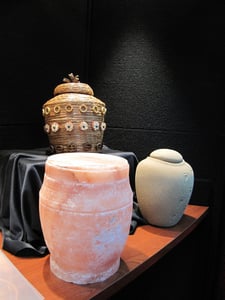(CN) - In a bizarre ruling on the oversight of cremated remains, the European Court of Justice found Wednesday that the Italian city of Padua cannot ban the safekeeping of cinerary urns by private companies.
 Padua, a city in northern Italy’s Veneto region, adopted the ban at issue in 2016, making it illegal for recipients of cinerary urns to contract with private companies that offer to store cinerary urns outside the home.
Padua, a city in northern Italy’s Veneto region, adopted the ban at issue in 2016, making it illegal for recipients of cinerary urns to contract with private companies that offer to store cinerary urns outside the home.
The law soon triggered a lawsuit from Memoria, a company in that very business, and Anatonia Dall’Antonia, a widow who wanted to use Memoria’s services after her husband died.
Asked to weigh in by the administrative court in Veneto region where the case is pending, the Third Chamber of the European Court of Justice ruled Wednesday that Padua’s ban contravenes EU law.
Cutting through the various defenses of the law offered by Padua and the Italian government, the five-judge panel found that the public health objective “cannot justify the restriction at issue in the main proceedings in so far as cremation ashes, unlike corpses, are biologically inert, since they have been sterilized by heat.”
“Accordingly their safekeeping cannot amount to a constraint imposed by public health considerations,” the ruling states.
As for concerns about respecting the memory of the deceased, the court said that governments can achieve this objective with less stringent measures — “in particular, the obligation to ensure the safekeeping of cinerary urns in similar conditions to those of municipal cemeteries and, in the event of cessation of activities, the obligation to transfer those urns to a public cemetery or to return them to the relatives of the deceased.”
The government also pointed to moral and religious values, saying they oppose businesses that would profit from the safekeeping of mortal remains.
“Nevertheless … it must be noted that it is apparent ... that the activity of the safekeeping of cremated ashes is subject in that member state to pricing fixed by the Minister for the Interior after consulting the Minister for Health and certain associations,” the ruling states.
“The opening up to private companies of activities of safekeeping of mortal remains could have been made subject to that pricing structure, which in itself is clearly not considered by the member state in question to be contrary to its moral and religious values.
“Therefore, as that was not done, the national legislation at issue in the main proceedings goes beyond what is necessary to attain the objective relied on, and, consequently, it cannot in any event be justified in the light of that objective.”
Subscribe to Closing Arguments
Sign up for new weekly newsletter Closing Arguments to get the latest about ongoing trials, major litigation and hot cases and rulings in courthouses around the U.S. and the world.








